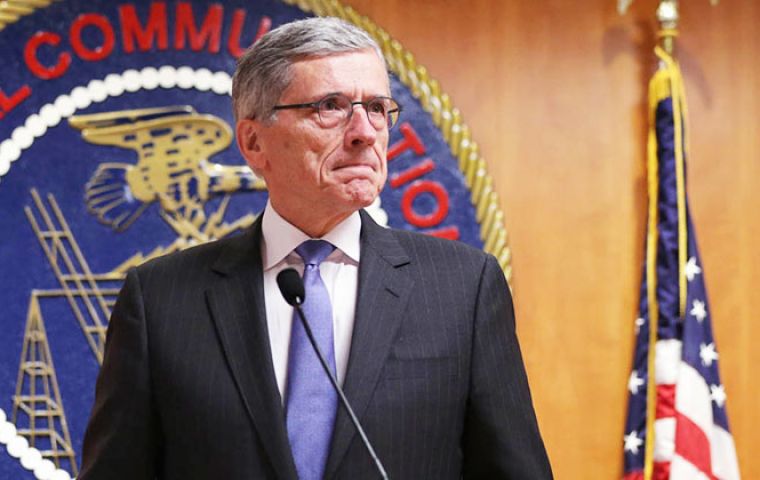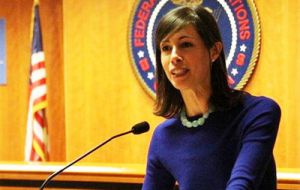MercoPress. South Atlantic News Agency
In landmark decision US approves tough Internet neutrality regulations
 After a decade of debate, we finally have “legally sustainable rules to ensure that the Internet stays fast, fair and open” said FCC Chairman Tom Wheeler
After a decade of debate, we finally have “legally sustainable rules to ensure that the Internet stays fast, fair and open” said FCC Chairman Tom Wheeler  Jessica Rosenworcel said: “We cannot have a two-tiered Internet with fast lanes that speed the traffic of the privileged and leave the rest of us lagging behind.”
Jessica Rosenworcel said: “We cannot have a two-tiered Internet with fast lanes that speed the traffic of the privileged and leave the rest of us lagging behind.”  “Overzealous government bureaucrats should keep their hands off the Internet,” complained House Speaker John Boehner
“Overzealous government bureaucrats should keep their hands off the Internet,” complained House Speaker John Boehner In a landmark decision for the future of the Internet, the United States Federal Communications Commission on Thursday approved tough net neutrality regulations to oversee online traffic. The new rules prohibit Internet service providers from discriminating against legal content flowing through their wired or wireless networks, such as by charging websites for faster delivery of video and other data to consumers.
The vote came after years of debate -- sharply partisan in recent weeks -- about how best to protect the Internet as online access becomes more vital to everyday life and as the industry that provides high-speed service continues to consolidate.
“Today, after a decade of debate, in an open, robust year-long process, we finally have legally sustainable rules to ensure that the Internet stays fast, fair and open,” FCC Chairman Tom Wheeler, the architect of the plan, told reporters after the vote.
Wheeler, a former lobbyist for the cable TV and wireless industries who has worked on technology issues in Washington for nearly 40 years, said Thursday was “the proudest day of my public policy life.”
The FCC's final vote to approve the plan was greeted with cheers by more than 300 people packed into the agency's meeting room. Many of them were consumer advocates and digital rights supporters who had pushed the FCC for years to take strong steps to oversee the Internet.
“This was a vote not just for Internet freedom, but for freedom and democracy,” declared former FCC member Michael Copps, now a special advisor for public interest group Common Cause.
But the FCC was divided along party lines on the issue, reflecting strong opposition by Republicans who accused President Obama of improperly interfering with the independent agency's deliberations to enact policies he has pushed since his days in the U.S. Senate.
Republicans on the FCC and in Congress blasted the new rules as risking burdening the Internet economy with heavy-handed government regulation.
“Overzealous government bureaucrats should keep their hands off the Internet,” said House Speaker John Boehner (R-Ohio).
The vote was 3-2, with the commission's Democratic majority backing a plan that puts broadband providers in the same legal category as more highly regulated conventional telephone companies.
Wheeler has promised a modernized, light-touch regulatory approach that would exempt Internet service from many of the tougher provisions, particularly rate regulation, permitted by its new designation under Title 2 of the telecommunications law.
“The Internet is the most powerful and pervasive platform on the planet. It’s simply too important to be left without rules and without a referee on the field,” Wheeler said in voting for the proposal. “The Internet is simply too important to allow broadband providers to be the ones making the rules.”
He said the new rules and classification were “no more a plan to regulate the Internet than the First Amendment is a plan to regulate free speech.”
FCC member Jessica Rosenworcel, who voted for the regulations, said: “We cannot have a two-tiered Internet with fast lanes that speed the traffic of the privileged and leave the rest of us lagging behind.”
“We cannot have gatekeepers who tell us what we can and cannot do and where we can and cannot go online,” she said.
Ajit Pai, one of two Republicans on the FCC, said the new regulatory proposal abandoned 20 years of bipartisan consensus “to let the Internet grow free from utility-style regulation.”
“It seizes unilateral authority to regulate Internet conduct, to direct where Internet service providers make their investments and to determine what service plans will be available to the American public,” he said.
The FCC's vote culminates a decade of efforts by Internet companies such as Amazon.com Inc. and Google Inc., public interest groups, digital rights advocates and key Democrats, including President Obama, to enact the toughest possible rules to protect consumers.




Top Comments
Disclaimer & comment rules-

-

Read all commentsGood. Following the Chilean example.
Feb 27th, 2015 - 01:36 pm 0Chile first country in the world to pass net neutrality in to law some years ago.
Finally!
Feb 28th, 2015 - 03:03 am 0Commenting for this story is now closed.
If you have a Facebook account, become a fan and comment on our Facebook Page!